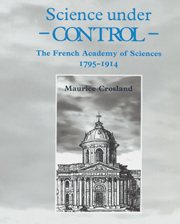Book contents
- Frontmatter
- Contents
- List of tables and figures
- Preface
- List of abbreviations
- INTRODUCTION
- 1 SCIENCE IN FRANCE
- 2 THE STRUCTURE OF THE ACADEMY
- 3 THE FUNCTIONING OF THE ACADEMY: SOME POSSIBLE ROLES
- 4 SCIENCE DIVIDED: THE SECTIONS
- 5 THE ACADEMICIANS
- 6 ELECTIONS: ‘GREEN FEVER’
- 7 REGISTRATION, JUDGEMENT AND REWARD
- 8 THE PRINTED WORD
- 9 AN ACADEMY UNDER GOVERNMENT CONTROL
- 10 ‘OUTSIDERS’: THE SCIENTIFIC FRINGE AND THE PUBLIC
- 11 THE INTERNATIONAL DIMENSION
- 12 THE CONTROL OF THE ACADEMY AND OF SCIENCE
- Name index
- Subject index
10 - ‘OUTSIDERS’: THE SCIENTIFIC FRINGE AND THE PUBLIC
Published online by Cambridge University Press: 09 October 2009
- Frontmatter
- Contents
- List of tables and figures
- Preface
- List of abbreviations
- INTRODUCTION
- 1 SCIENCE IN FRANCE
- 2 THE STRUCTURE OF THE ACADEMY
- 3 THE FUNCTIONING OF THE ACADEMY: SOME POSSIBLE ROLES
- 4 SCIENCE DIVIDED: THE SECTIONS
- 5 THE ACADEMICIANS
- 6 ELECTIONS: ‘GREEN FEVER’
- 7 REGISTRATION, JUDGEMENT AND REWARD
- 8 THE PRINTED WORD
- 9 AN ACADEMY UNDER GOVERNMENT CONTROL
- 10 ‘OUTSIDERS’: THE SCIENTIFIC FRINGE AND THE PUBLIC
- 11 THE INTERNATIONAL DIMENSION
- 12 THE CONTROL OF THE ACADEMY AND OF SCIENCE
- Name index
- Subject index
Summary
Out[side] of the pale of the Institute and those who aspire to its honours, there is infinitely little.
(R. Chevenix, Edinburgh Review, 34 (1820), 411.)I demand as an amendment to Article 1 of the regulations [of the Institute] that the meetings of every Class should be held in public. The public will derive great advantages for their education. Also, if members of the Institute are placed under the public gaze, they will not fall asleep in their academic chairs.
(Dupuis, Conseil de 500, 15 March 1795.)For two years an idea had been absorbing all my research and a hope had been consuming me. I had finally captured the idea and I thought that fortune was smiling. In those days young men knew only one dream, a king of glory, whose temple was the Academy of Sciences, guardian of truth … I remember how I trembled when I dared to speak to one of [the Academicians] in the courtyard of the Institute.
(Raspail, quoted by Dora B. Weiner, Raspail, scientist and reformer, New York, 1968, p. 84).On the fringe of official science
All groups make distinctions between members of that group and non-members. Such distinctions apply to nationalities, to races, to schools and to learned societies. If the learned society in question was one of ancient lineage with government sponsorship and the very highest standards of membership, one should not be surprised if the distinction between members and non-members was almost an absolute one.
- Type
- Chapter
- Information
- Science under ControlThe French Academy of Sciences 1795–1914, pp. 331 - 368Publisher: Cambridge University PressPrint publication year: 1992



